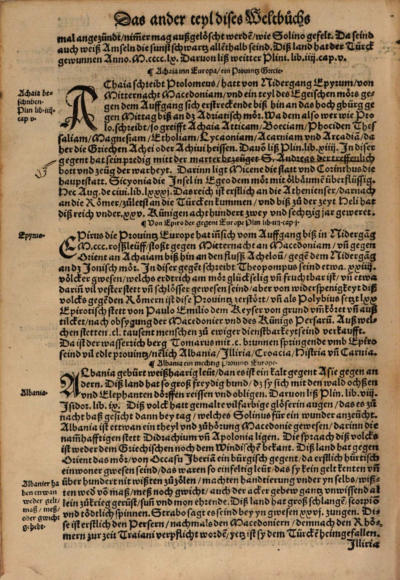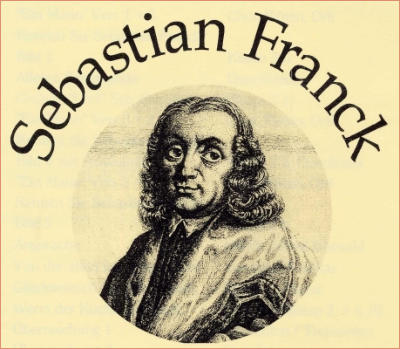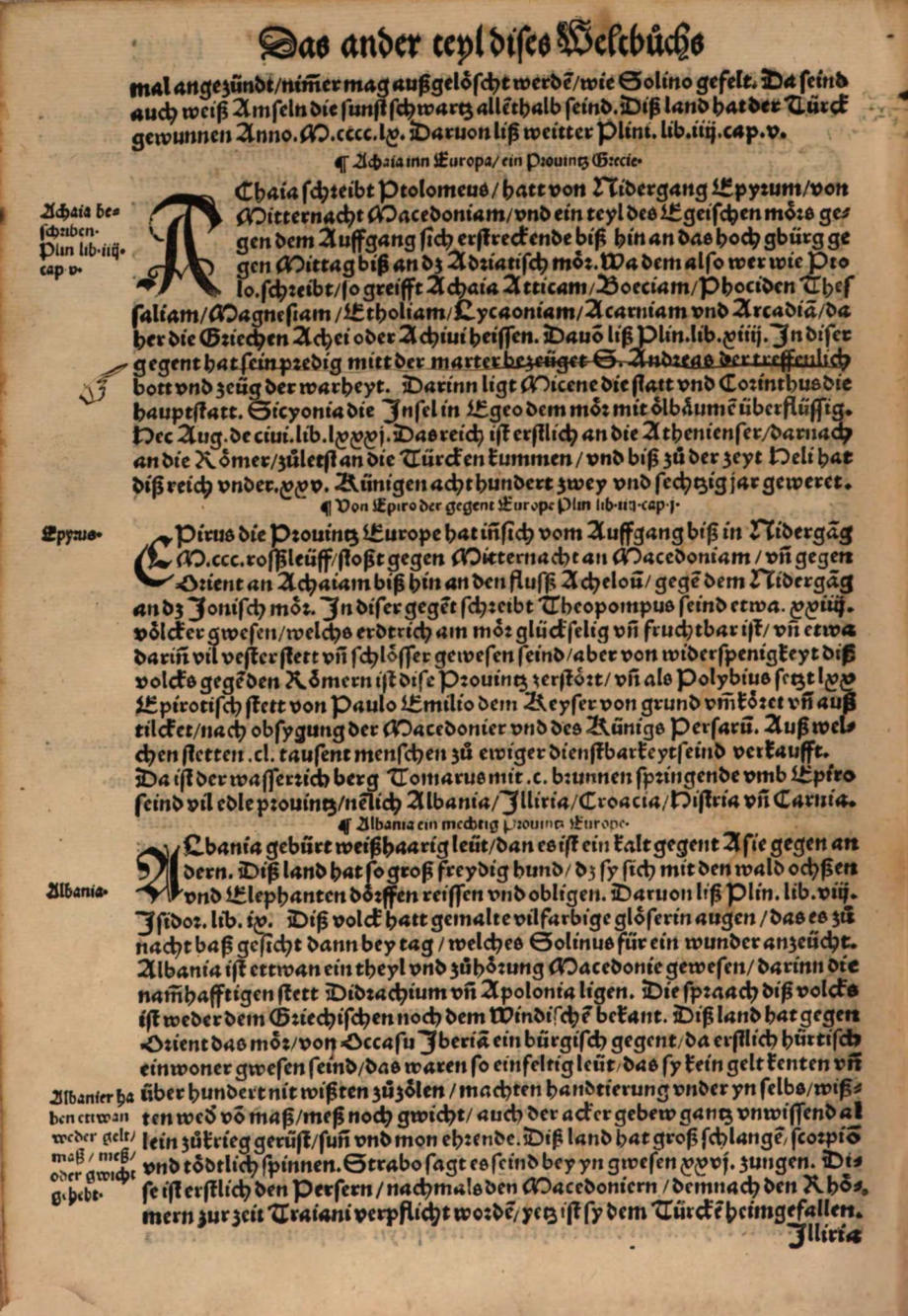
1534
Sebastian Franck:
Albania: A Mighty Province of Europe
Sebastian Franck (1499- ca. 1543) was a German humanist, theologian, publisher and geographer. Born in Donauw├Črth in Bavaria, he studied theology in Ingolstadt and Heidelberg and converted, under the influence of Martin Luther, to Protestantism. Franck is remembered as a great promoter of freedom of thought. From 1535 to 1539 he ran a printing press in Ulm. Among his publications was a book on the geography of the world called ŌĆ£Weltbuch: Spiegel und Bildnis des ganzen ErdbodensŌĆØ (World Book: Mirror and Image of the Whole Planet), T├╝bingen 1534. This work contains a text on Albania and the Balkan region, taken here from the second edition (published in Ulm in 1542). It is very much a period piece, heavily influenced by Hartmann SchedelŌĆÖs ŌĆśNuremberg ChronicleŌĆÖ (1493) and by Pliny the ElderŌĆÖs ŌĆśNatural History,ŌĆÖ and reveals how little was still known about the western Balkan region in the sixteenth century. Of Epirus in the Region of Europe (Pliny Book 4, Chapter 1) Epirus, a province of Europe, is from east to west 300 horse rides long. (1) It borders to the north on Macedonia, to the east on Achaea right to the river Achelous, and to the west on the Ionian Sea. Theopompus wrote of this region that it comprised about 24 peoples. It has prosperous and fertile land on the coast, and there were many strong cities and fortresses there, but the province was destroyed because of a revolt of this people against the Romans, and as Polybius notes, 70 Epirotic cities were razed and wiped out by Aemilius Paullus for the Emperor following the defeat of the Macedonians and the King of Persia. From these cities, 150,000 people were sold into perpetual slavery. There is a mountain called Tomarus [Tomorr], rich in water stemming from 100 sources. In the region around Epirus there are many fine provinces, namely: Albania, Illyria, Croatia, Nistria [Istria] and Carnia [Kvarner]. Albania: A Mighty Province of Europe People in Albania are born with white hair for it is a cold region facing Asia. This country has such huge stray dogs that they can attack and slay wild bulls and elephants. Concerning this, read Pliny, Book 8, and Isidore, Book 9. These people have colourfully painted, bright eyes such that they can see better by night than by day. Solinus was amazed at this. Albania was more or less a part of Macedonia and belonged to it. In it are situated the famed cities of Didrachium [Durrachium = Durr├½s] and Apollonia. The language of this people is understood neither by the Greeks nor by the Wends [Slavic]. To the east lies the sea and to the west lies Iberia. It is a mountainous region and the inhabitants were originally herdsmen. They were such simple people that they did not know what money was. They did not know how to count above one hundred. They remained busy among themselves. They did not know weights and measures, nor did they know how to farm at all. They were equipped solely for warfare, and worshiped the sun and the moon. This country has huge snakes, scorpions and deadly spiders. Strabo says that they had 26 languages. It was initially subjugated by the Persians, then by the Macedonians, and thereafter by the Romans at the time of Trajan. Now it has been conquered by the Turks. Illyria ŌĆō a Wendish Land After the region of Albania come the Illyrian peoples to the west and north. We now call them Wends [Slavs]: some are called Bosnians, some Dalmatians, some Nistrians, some Croatians and some Cranians [Carniolans]. The Bosnians are situated in the interior towards Hungary in the north. The others, situated on the coast, stretch to the Timanian sources. This region regards the Manichean heresy as Christian. Namely, all things depend on their origin ŌĆō good is from good and evil is from evil [?]. They do not recognise the authority of the Roman Church. They do not profess that Christ is the same as the Father and, although they are autonomous, they regard themselves as Christians. Their monasteries are situated in remote places in wildernesses and wastelands. If a woman falls ill, it is custom for her to join these holy men and promise to serve them. When she recovers her health, she stays with them for a year in a monastic community, together with her husband who also serves God. These regions have no weapons, nor can an anathema overcome them. On Illyria, see Pliny Book 3, Chapter 21. Dalmatia, Slavonia, Liburnia, Croatia Dalmatia is a region of Europe around Wendish territory, situated between Hungary and Macedonia. It is now called Slavonia. Above it at the end is Liburnia and at the beginning is Dalmatia which is now called Croatia. This may also be a province of Slavonia. It is a country of ferocious, rapacious people. On Liburnia, see Pliny, Book 3, Chapter 22. (1) A ŌĆ£horse rideŌĆØ (German Pferderitt, Latin equidium) was a measure equivalent to one-sixteenth of a French mile. [excerpt from: Sebastian Franck, Weltbuch: spiegel vnd bildtnis des gantzen Erdtbodens, von Sebastiano Franco W├Črdensi in vier b├╝cher, n├żmlich in Asiam, Aphricam, Europam vnd Americam gestelt (Ulm 1542), pp. 89r-90v. With the kind assistance of Xhavit Muslija (Rothenthurm, Switzerland). Translated from the early New High German by Robert Elsie.]




Excerpt from the original German text of Sebastian
FranckŌĆÖs ŌĆ£World Book: Mirror and Image of the
Whole PlanetŌĆØ (1534).
The German humanist Sebastian Franck
(1499 ŌĆō ca. 1543).

| Robert Elsie | AL Art | AL History | AL Language | AL Literature | AL Photography | Contact |

![Schlie▀en [x]](index_htm_files/close.png)

